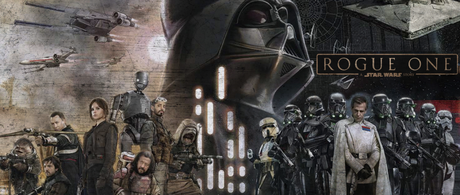
When Disney paid a gajillion bajillion dollars (I'll have to check on those numbers later, but they sound right) to pry LucasFilms away from George Lucas they weren't buying something which would court controversy or had politically divisive messaging. They were buying proven financial widgets (i.e., the Star Wars movies) which could easily slot into specific fiscal quarters and be used in a synergistic way to trickle down to TV shows, comic books, novels and children's books, home video, toys and just about any other product imaginable. A cursory glance at The Force Awakens's record-setting box office, and the robust toy sales reveals their strategy is proceeding smoothly.
That's what Disney CEO Bob Iger was attempting to protect last weekend at the Rogue One-A Star Wars Story premiere when he said, "It is not a film that is, in any way, a political film. There are no political statements in it, at all."
Wait. Hold on. He wouldn't have just randomly volunteered that information. It's not like some vapid reporter asked him, "Can you believe all of these people here for the premiere? Are you feeling [pause for lame punchline] the force?" and he blurted out, ""It is not a film that is, in any way, a political film." No, someone asked him specifically about that, but this had to have come from somewhere. How did Rogue One suddenly become so political?
Sigh. Welcome to 2016.
As Fusion's Isha Aran explained, "After noticing that the cast of Rogue One happens to include quite a few brown folks and women in it, [white supremacists] have been feeling really attacked and have-you guessed it-started calling for a boycott of Star Wars." Because it worked so well with Hamilton.
The boycott actually goes back to August around the time the first Rogue One trailer came out, showcasing the multi-colored cast and cementing the fact that the whole Force Awakens diversity experiment of having a white woman (Daisy Riddley), black man (John Boyega) and Cuban-Guatemalan man (Oscaar Isaac) play three of the leads was not a momentary indiscretion. Instead, it's the new modus operandi of the Star Wars franchise, presenting a more diverse cast for a global franchise reliant upon the worldwide audience to buy enough tickets to warrant the extreme production budgets and marketing costs.
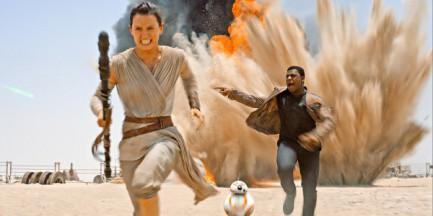
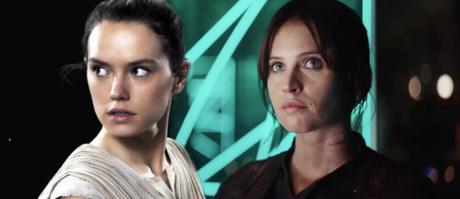
If some white supremacists or, in the case of Force Awakens, men's rights activists (e.g., how dare they make a Star Wars movie with a female lead!) don't like it who the flip cares.
Well, for one, Rogue One 's screenwriters sure cared. Chris Weitz tweeted, "Please note that the Empire is a white supremacist (human) organization," to which his co-writer on the film, Gary Whitta, responded, "Opposed by a multi-cultural group led by brave women."
That was a mistake. They inadvertently turned this into a news story, specifically the story of how the writers of a major film were fighting with fans on Twitter and taking an actual political stance on something and upsetting their corporate overlords in the process. Are we not allowed to simply ignore the internet crazies anymore? When white supremacists threaten to boycott their latest perceived enemy in pop culture can we not just laugh it off as the hateful words of those clearly on the wrong side of history? Must the storytellers and financial gatekeepers of the world seriously justify such idiocy with an actual response? Or are we doomed to 4 years of constant face-palming like CNN's Alisyn Camerota in response to the rise of real life Idiocracy?
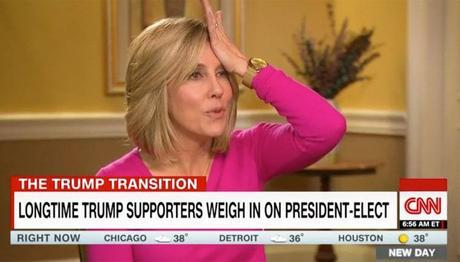
Of course, Bob Iger is wrong about the franchise he spent all those dollars to revive. Star Wars is and always has been inherently political, an overly obvious Nazi allegory created by a man reflecting on the state of the world during the Vietnam War. However, Iger's denial and need to distance Rogue One from any trace of controversy, be it the white supremacist boycott or persistent rumors of a troubled behind the scenes production, is understandable. Post-Trump, just about everything seems political, and that is simply not what audiences want from their movies right now. Escapism, escapism and, oh, did I already mention, escapism is the rule of the day. As Deadline recently reported, "Unless the audience radically changes its behavior in the next few weeks, 2016 is poised to become the first year in which no film set in the real world placed in the Top 10 at the domestic box-office."
That doesn't mean these fantasy or heightened reality world movies can't have anything real to say about the world. Zootopia uses its fantasy world of anthropomorphized animals to teach kids about the persistent evils of xenophobia. Fantastic Beasts is at least partially about repression, clearly playing Ezra Miller's character's religiously dictated need to repress his magical powers as a metaphor for him repressing his own homosexuality. Batman v Superman fails in just every way possible, but somewhere buried in there is a potentially honest attempt to recontextualize 9/11 in superhero terms, although such messaging has been overused by so many blockbusters that it's lost all meaning.
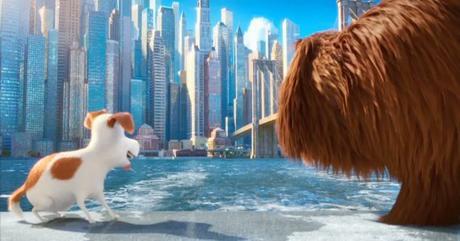
But most of the top films this year (e.g., Finding Dory, Secret Life of Pets, Deadpool, Doctor Strange) have just been fun movies that do fun things and offer pure escapism. That's what Disney wants Rogue One to be, especially as populist distrust of the media threatens to spill over into renewed debates about Hollywood being run by a bunch of liberals pursuing their own leftist agendas (that is often true of the content creators, but could not be further from the truth about the corporate bosses who just want to make a buck). You don't want to get that kind of stink on your movie, or else you risk turning into Miss Sloane, Jessica Chastain's gun control drama which bombed quite spectacularly last weekend.
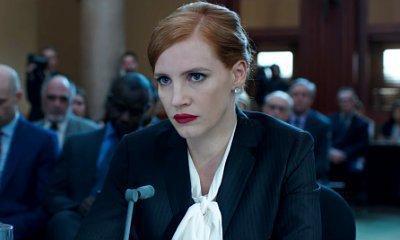
And I immediately regret making that comparison because, come on, Rogue One and Miss Sloane? They could not be any more different. Maybe if Miss Sloane had actually been liked by critics it would have done better, but it was never going to win over anyone who doesn't already agree with its viewpoint because that's not how the Facebook filter world of today works. Rogue One, however, is immune to such forces because films of that size are usually too big too fail or at least too big to be felled by a "some people somewhere are protesting for some reason" blip on the news radar. In fact, as I am writing this article millions around the world are watching Rogue One right now and ranting and raving about it on social media. So, yeah, so much for that boycott.
However, if Rogue One is truly too big to fail then why couldn't it actually feature some social commentary? Would it really be so bad if the Rebels in the movie reminded some people of Arab spring freedom fighters, or if the Empire and its race to create the ultimate weapon in Death Star was subtly compared to the US's race to create the atomic bomb in WWII, drawing into question whether or not we should really see ourselves in the Rebels or Empire?
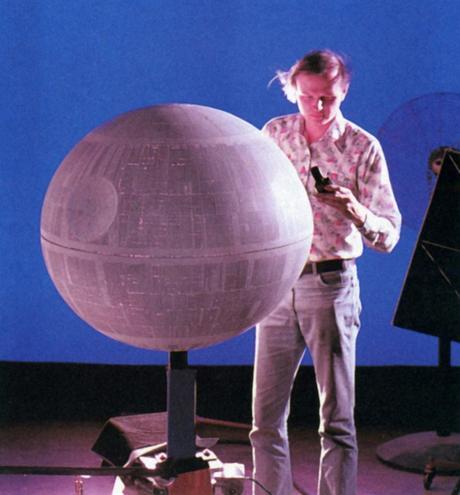
Whatever, revisionist history college boy. That's not what Star Wars is about.
Lucas' mistake with the prequels...hold on, one of his many mistakes with the prequels was he made the story too specific. The original films are about the battle of good vs. evil; the prequels are about trade treaties, phony wars, government conspiracies and the death of democracy in the face of trumped up fear through a manufactured conflict. The rise of the Emperor in Clones and Sith was modeled after the ascensions of Caesar, Napoleon and Hitler, but Lucas' inspiration for the character was actually Richard Nixonas, as he told StarWars.com in 2005, "It was really about the Vietnam War, and that was the period where Nixon was trying to run for a [second] term, which got me to thinking historically about how do democracies get turned into dictatorships? Because the democracies aren't overthrown; they're given away." However, seeing the story play out in the prequels at the same time as the Iraq-Afghanistan Wars raged and civil liberties were being infringed upon by a paranoid government lent the films an extra degree of resonance, regardless of whether or not any such political commentary was intentional.
But, for better or worse, that's not what people want from Star Wars. They want a comforting, simple mythology about good defeating evil, one based in history but generalized enough that all people can see themselves in the heroes. As Vulture pointed out, "Pick nearly any spot on the political axis and you can declare that Luke Skywalker is standing right next to you. Are the Rebels liberal? Definitely! They're a racially diverse popular front resisting authoritarian oppression and genocide. Are the Rebels conservative? Of course! They're a well-armed militia fighting an untrustworthy and anti-democratic centralized government in the name of individual liberty."
So, is Rogue One a political movie? Only as much as you want it to be. If white supremacists can view Darth Vader as a personal hero then any Star Wars interpretation is possible.

